 Petzlover
Petzlover Birman is originated from France but Jungle-Bob is originated from United States. Both Birman and Jungle-Bob are having almost same weight. Birman may live 5 years more than Jungle-Bob. Both Birman and Jungle-Bob has same litter size. Both Birman and Jungle-Bob requires Moderate Maintenance.
Birman is originated from France but Jungle-Bob is originated from United States. Both Birman and Jungle-Bob are having almost same weight. Birman may live 5 years more than Jungle-Bob. Both Birman and Jungle-Bob has same litter size. Both Birman and Jungle-Bob requires Moderate Maintenance.
 There isn’t clarity as to this exquisite cat’s origins. Many people believe they originated as the companions of temple priests in northern Burma.
There isn’t clarity as to this exquisite cat’s origins. Many people believe they originated as the companions of temple priests in northern Burma.
The cats somehow found their way to France, and it is believed that they have been in France since the 1920s.
The cats nearly disappeared during World War II, but luckily the remaining Birmans that survived were crossed with Siamese and Persians to strengthen the breed. In the early 1950s, pure Birnam litters were produced. It was in about 1959 that Birmans were brought to the United States.
The cats were also recognized in Britain in 1965 and in 1966 by the CFA. The first Birman cats were seal point but later other colors were brought in such as red, chocolate, and tabby.
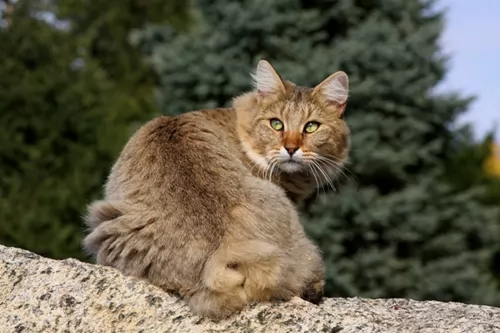 What is notable about this cat is that it can have a Bobcat like tail or it can have a full-length tail. They’re a fairly new breed and have been bred since the early 1990s. The whole purpose of breeding the cat was to develop a jungle cat hybrid with a spotted pattern.
What is notable about this cat is that it can have a Bobcat like tail or it can have a full-length tail. They’re a fairly new breed and have been bred since the early 1990s. The whole purpose of breeding the cat was to develop a jungle cat hybrid with a spotted pattern.
 These are medium-sized cats which can become fairly large. They can weigh up to 4, 5 or 6kg. They are fairly heavily boned with a broad face and ears that are widely spaced.
These are medium-sized cats which can become fairly large. They can weigh up to 4, 5 or 6kg. They are fairly heavily boned with a broad face and ears that are widely spaced.
The round eyes are deep blue. The cat’s fur is medium-long and should be silky to the touch with no undercoat. Ther cat is a moderate shedder.
The base color is whitish to cream, but the kittens are always born white. Coat color, whether red, cream, or chocolate is always pointed and the cat always has the white paws.
The Birman isn’t as outgoing as some of the other cat breeds and its a quiet, docile intelligent cat that attaches itself to one particular family member. They can actually become jealous of their human companion and demand their attention.
These friendly cats are wonderful choices for families with children and dogs. They are calm and affectionate, and softly spoken, quietly letting you know when it’s dinner time and enjoying just being around his human family.
He is able to get along well with kids and other pets in the home. He can become quite playful too and because he is so intelligent, you can buy him some toys that require him to think.
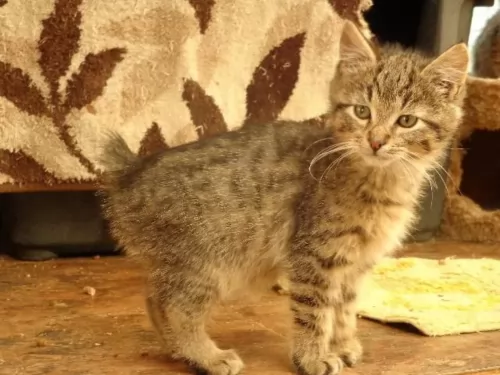 These are big cats and can weigh between 6 and 10kg. The leopard-spotted coat comes in all shades – brown, tawny, gold, silver and black with you not likely to see solid shades.
These are big cats and can weigh between 6 and 10kg. The leopard-spotted coat comes in all shades – brown, tawny, gold, silver and black with you not likely to see solid shades.
The coat can be short or medium-length. The cats have a thick muzzle and he has hooded eyes. The ears are fairly large and placed high o the head. They’re well muscled with long legs with the hind legs being fairly longer than the front legs
The Jungle-Bob loves his food. He loves interactive toys that hold the food and encourage him to think about how to get the food out.
He loves his human family and bonds strongly with them, loving to play rough and tumble games with the kids. He gets on well with children as well as other pets in the house.
You may find your Jungle-Bob being shy and not wanting to be friendly with strangers. They’re intelligent cats and have been known to learn how to open certain doors and cupboards. They can also be taught to walk on a leash.
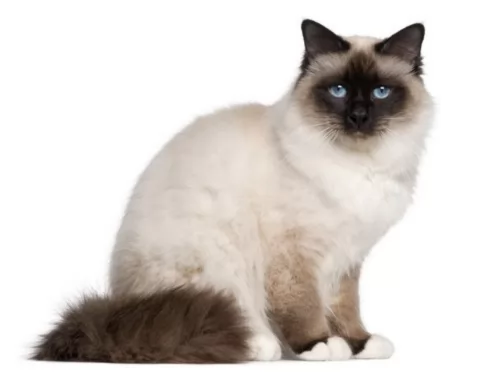 The Birman cat has to be one of the most beautiful cats there are, but the cat isn’t only a beautiful cat, it has wonderful characteristics as well.
The Birman cat has to be one of the most beautiful cats there are, but the cat isn’t only a beautiful cat, it has wonderful characteristics as well.
It is a loving, affectionate cat with his human family, loving to spend time around them. Playful and healthy, when you bring this most wonderful cat into your home, it will be as though an angel has come to stay.
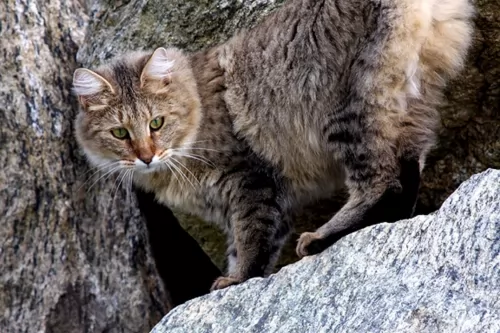 Your Jungle-Bob, just like all cats with a wild side, should have a largish outdoor cage. Keeping a hybrid cat like the Jungle-Bob is far more challenging than keeping a regular domesticated cat.
Your Jungle-Bob, just like all cats with a wild side, should have a largish outdoor cage. Keeping a hybrid cat like the Jungle-Bob is far more challenging than keeping a regular domesticated cat.
Hybrid cats like these are always active and they require lots of exercise. They can learn to walk on a leash.
Hybrid cats like this are made up of many species and they come with lots of interesting fur patterns. but that shouldn't be your motivation for buying one.
Think carefully before you own one of these cats as they’re beautiful for sure, but sometimes they become too much for the owners and then they land up in shelters. Be informed before you invest in one of these cats.
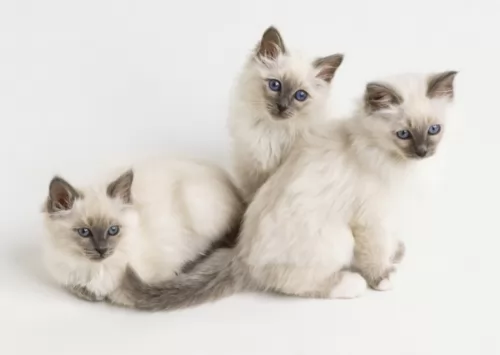 With good health your Birman can reach up to 13 years of age. With the Birman, the most serious illness is feline hypertrophic cardiomyopathy which also happens to be the most common heart disease in cats.
With good health your Birman can reach up to 13 years of age. With the Birman, the most serious illness is feline hypertrophic cardiomyopathy which also happens to be the most common heart disease in cats.
It’s a progressive disease and can result in heart failure. The cats are also at risk of developing feline infectious peritonitis.
Also, because this is a larger cat and a stocky kind of breed, it can easily put on weight and then become overweight. Strict attention will need to be given to diet as well as daily exercise.
Also, look out for Corneal dermoid - skin and hair on the surface of the cornea in one eye or in both. Luckily this is an eye problem that can be surgically corrected.
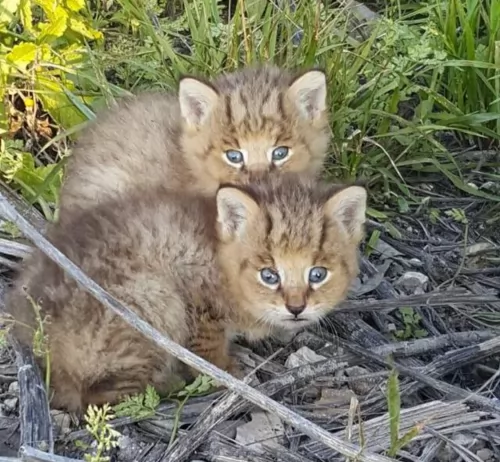 Even a trip to the vet can be a challenge and it can be a frightening experience for a hybrid cat. They may even need to be sedated before the vet can examine them.
Even a trip to the vet can be a challenge and it can be a frightening experience for a hybrid cat. They may even need to be sedated before the vet can examine them.
Also, did you know that in terms of rabies, which can be a fatal disease, it is not positive that these vaccines even work with a hybrid cat? So if your pet is exposed to rabies, it could spell great danger for you and your hybrid pet.
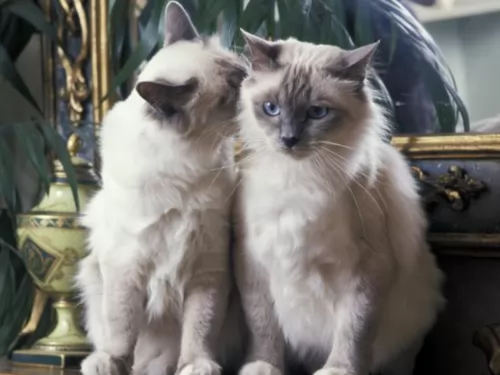 The Birman has a silky coat that sheds moderately so you want to give him a gentle brush once or twice a week to keep the coat of his soft and silky.
The Birman has a silky coat that sheds moderately so you want to give him a gentle brush once or twice a week to keep the coat of his soft and silky.
The Birman has a full topcoat, with no undercoat which means that you won’t have the coat matting or tangling.
He’ll need his nails trimmed and his teeth checked regularly. Your vet or professional groomers can do this for you and clean his teeth and check that there are no bad teeth making your pet sick.
The Birman cat has access to some great commercial cat food as there are some seriously good quality ones.
Many cat lovers choose cat foods that are AAFCO (Association of American Feed Control Officials) approved. It at least provides minimum standards for pet foods.
For your Birman you want to avoid artificial flavors and preservatives. Choose quality foods high in meat protein. As a carnivore, a cat has a huge need for meat protein. Get to know your pet food labels and choose foods with added taurine and vitamin A.
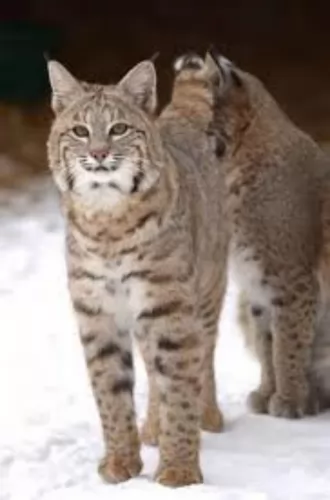 Before you invest in one of these hybrid exotic cats do research because they’re different from your regular domestic cats.
Before you invest in one of these hybrid exotic cats do research because they’re different from your regular domestic cats.
Because they have a wild side, they’re not suited to small apartments. Apart from being both an indoor and outdoor cat, he will require a fairly large outdoor cage with one part dedicated to shade and shelter for him.
Even though you will buy your Jungle Bob a litter box for indoors, remember that even though you train your cat to use it, the wild part of the cat means that he will spray and do his business on your carpets or against your furniture as well.
This is precisely why so many cat shelters are full of these cats. They become a handful for their owners, and their owners just hand them in as a bad experience.
A hybrid cat like the Jungle-Bob has a digestive system not quite the same as your regular domestic cat. It is absolutely imperative that these cats receive a meat diet as they are carnivores.
Keeping such a cat as a pet means you will need to invest in high-quality protein foods that sit well with this cat’s digestive system. A good guide for the Jungle Bob-cat is to steer clear of carbohydrates and feed your cat a protein-rich diet.
It is also a wise move to feed your new kitten the food that he has been eating at the breeder and then to make a gradual change to the best food protein there is.
Speak to your vet if in any kind of doubt. There are excellent high protein, high-quality commercial cat foods available on the market that make feeding a cat convenient as well.